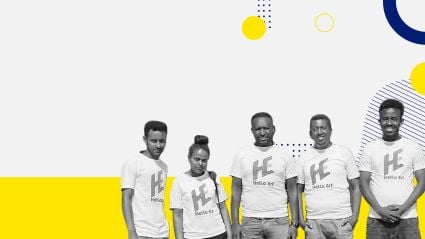
“What we have seen in relation to COVID-19 is an amplification of existing fault lines of inequality, particularly in respect of gender.”
In South Africa, estimates suggest COVID-19 destroyed a decade’s worth of employment growth in just four months. And of the 3 million jobs lost in Q1 and Q2, according to NIDS-CRAM data, two million were held by women. The Q3 labor force survey shows that some jobs have recovered, but that unemployment has grown overall.
“What we have seen in relation to COVID-19 is an amplification of existing fault lines of inequality, particularly in respect of gender,” says Caroline Skinner, Urban Research Director and Publications Editor for Women in Informal Employment: Globalizing and Organizing (WIEGO) and Senior Researcher at the African Centre for Cities at the University of Cape Town. “People are speaking about a ‘she-cession’ instead of a ‘recession’ because, in line with what’s happening globally, two-thirds of jobs lost in South Africa have been lost by women workers.”
In addition to suffering most of the job losses, many women workers have not been able to benefit from government relief measures. Government resources have been particularly hard to access for women in informal employment. The reasons for this are historical and contemporary, as this article explores.
South Africa’s lockdown had dire impacts on the informal economy, particularly on women
South Africa responded swiftly to the COVID-19 pandemic, declaring a National State of Disaster in March 2020, and instituting a strict lockdown. The lockdown was enforced through a series of regulations which identified which sectors of the economy could remain open, and which resulted in the closure of public schools.
Level 5, the strictest level of the lockdown, ran from 27 March until 30 April, confining all South Africans to their place of residence “unless strictly for the purpose of performing an essential service, obtaining an essential good or service, collecting a social grant, or seeking emergency, lifesaving, or chronic medication.” The definition of essential services was changed several times during Level 5, each time affecting the types of informal workers who were able to continue working.
According to a set of recently published research reports based on the National Income Dynamics Study Coronavirus Mobile Survey (NIDS-CRAM) data, the lockdown had dire effects on informal workers, particularly women workers.
The NIDS-CRAM findings show 29 percent of men and 33 percent of women in informal employment were ‘locked out’ in April and that women in the informal economy saw a decrease of 49 percent in the typical hours worked in April 2020, compared to a 25 percent decrease for men. For informally employed women, typical earnings decreased by nearly 70 percent between February and April. And all of these losses occurred in an economy that had 28 percent unemployment for men and 32 percent unemployment for women in March 2020 and that has had high unemployment rates for the past decade.
The pandemic’s economic impacts exacerbated pre-existing inequities
The fact that women were more severely impacted by the economic downturn is perhaps unsurprising, given a wider historical context. Gendered differences in employment and income were already severe before the pandemic. In particular, a gender pay gap persisted across all sectors of the South African economy, including in the informal economy.
The Department of Trade and Industry reported that women faced particular challenges in starting small businesses including poor financial literacy, negative attitudes toward women borrowers within banks, and a lack of appropriate financial products. And women who were able to launch their own businesses typically saw lower incomes compared to businesses owned by men. According to a PwC report (2019), 76 percent of female-owned, non-VAT registered informal businesses earned less than R3000 (about US$193) per month, compared to 58 percent of male-owned businesses. A review from Statistics South Africa of the self-employed in 2017 found the proportion of informal businesses run by women has steadily declined since 2001.
“The gendered implications stemmed from the situation prior to COVID-19 and the impact that the closure of schools and Early Childhood Development Centres had on women’s increased burden of care.”
During the pandemic, women were forced out of the economy because of their care responsibilities, and as of June 2020, women fell far behind men in terms of returning to pre-COVID-19 employment levels. “The gendered implications stemmed from the situation prior to COVID-19 and the impact that the closure of schools and Early Childhood Development Centres had on women’s increased burden of care,” says Caroline Skinner, of WIEGO and the African Centre for Cities.
Pre-pandemic research from the Human Sciences Research Council (2019) showed that women’s work was perceived as secondary to their parental and care roles. Children were far more likely to live in a home with just their mother (43 percent) than with just their father (3 percent). Even where both parents were present in the household women spent, on average, 107 more minutes per day on household maintenance and childcare than men.
In many cases, relief efforts did not reach those who needed them most
In response to the economic hardship caused by COVID-19, the South African Government attempted to mitigate the economic and social impact of the pandemic and lockdown by announcing several relief measures including a Temporary Employer/Employee Relief Scheme (TERS) drawn from the Unemployment Insurance Fund (UIF), temporary (six-month) increases in the Rand value of social grants, a special COVID-19 Social Relief of Distress Grant, and additional support for small businesses.
“The special relief measures had limited cushioning effect for informal workers, particularly women workers, because many of the measures were inaccessible to them.”
WIEGO’s Skinner explains, “The special relief measures had limited cushioning effect for informal workers, particularly women workers, because many of the measures were inaccessible to them.”
TERS only enabled employers already registered with the Unemployment Insurance Fund to claim a percentage of the cost of salaries on behalf of their employees. Few informal workers or informal employers were registered at the start of the COVID-19 lockdown. For example, only 20 percent of South Africa’s 1.2 million domestic workers (almost all of whom are women) report being registered for UIF.
Thozama Gwente, Western Cape Chairperson of the South African Informal Traders Alliance, explains, “Few of us who owned businesses were registered with UIF. Some of us didn’t even know it existed. We didn’t know how to register or that we should.” In addition, the small-business support measures introduced by the Department of Small Business Development included a host of criteria among which was registration with the UIF, the South African Revenue Services, and the Companies and Intellectual Properties Commission (CIPC) – excluding, by definition, informal operators.
Although the government has tried to support businesses seeking to register with the UIF, educating informal workers about available resources remains difficult, explains Gwente. “We can’t do public awareness meetings like we used to because of COVID-19 and social distancing. So we try to reach people by phone, but we don’t always have airtime. When we try to communicate using data, we leave those without smart phones behind.”
These and related developments also had a profound impact on household hunger. The Child Support Grant, which is usually allocated per child under an adult’s care was increased by a nominal amount of R500 per caregiver from June 2020, rather than per child. Schools were abruptly closed in March, meaning the closure of the school feeding schemes relied upon by many families. “We didn’t have an income and the little money we had saved from our businesses we had to use to buy food,” says Gwente. The small increases in grant-funding were insufficient to cover the costs of household food baskets, and household poverty increased. Many mothers went hungry during COVID-19 so that their children could eat.
Again, women tend to be disproportionately affected here. Prior to COVID-19, female-headed households were also more likely than male-headed households to face food insecurity, though they also received a large portion of government support. While 44 percent of all households in South Africa received at least one social grant in 2018 (state funded social security), women were the primary recipients of pre-pandemic social grants and black women were the single largest recipient group (8.3 million women, or 46 percent of grant recipients). But during the COVID-19 response, emergency economic measures and increases to existing social grants have not reached many of the women who needed government support.
What comes next? Policymakers may still be missing the mark
South Africa recently published its Medium-Term Budget Policy Statement. The budget included, among other things, yet another R10.5 billion bailout of South Africa’s state-owned airline, South African Airways (SAA). For Skinner, this is a worrying prioritisation of funds.
“The comparison of ‘people vs planes’ has been made, suggesting that if the state can find money to bailout SAA they should similarly be able to find enough money to increase social grants. Hopefully the doors for discussion are not closed and civil society will galvanize around this.”
Skinner lays out two priorities for assisting women in the informal sector during the COVID-19 recovery period. “Increasing the reach and value of grants would be the first step. Cash grants put money into the hands of poor working women, and this injects money into local economies, goods, and services increasing employment at a local level.” Second, Skinner says, “There is a need to reform the unemployment insurance system so that informal workers, notably domestic workers, can access it.”
For her part, Gwente is concerned about the future. “All I hope now is that COVID-19 doesn’t get worse and it doesn’t come back. But we are worried for a second wave of infections and what that would mean.”
About the Author
Jennifer Smout is a feminist writer based in Cape Town, South Africa. She has worked extensively in the field of gender over the past decade, partnering with the state and civil society to draw attention to gender inequalities and to identify solutions.










